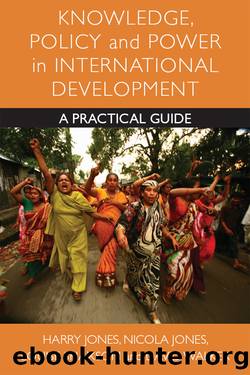Knowledge, Policy and Power in International Development: A Practical Guide by Jones Harry & Jones Nicola A

Author:Jones, Harry & Jones, Nicola A. [Jones, Harry & Jones, Nicola A.]
Language: eng
Format: epub
Tags: Public Policy, Political Science, Public Affairs & Administration, General
ISBN: 9781447308263
Google: 7F2mAwAAQBAJ
Publisher: Policy Press
Published: 2012-04-18T10:32:12+00:00
Linking citizen knowledge to policy
We can analyse the power dynamics affecting the role of citizen knowledge in policy by referring to Stirlingâs (2008) classification of normative, instrumental and substantive imperatives.10 There may be some level of each in any policy process, but separating them out helps to crystallise their relative merits.
The normative reason for incorporating citizen knowledge in policy relates to the democratic imperative: to provide space for the broad-based expression of citizen desires. In many cases, however, the political context does not provide this sort of space. Although its intellectual origins lie in ancient Greece, substantial and meaningful political systems of representative democracy are only a relatively recent arrival to developed countries. Elsewhere, such systems are non-existent or in their early stages, and allow very little expression of voice in public policy at all, let alone more direct incorporation of citizen knowledge into policy or practice (see Chapter Two). In these situations, any experiential or lay knowledge of issues incorporated in policy is likely to be representative of policymakers and elites, which may be a vicious cycle, as inequality is frequently reinforced by beliefs that it is in some way the natural order of things (Bebbington et al, 2006). In a similar vein, politicians often frame policies in terms of prevailing perspectives and values of groups that could function to support or hinder the progress of decision making or implementation (see Chapter Three), which again could serve to reinforce biases and inequalities.
The tacit nature of citizen knowledge means that significant trust is required in order to draw on it, especially by âoutsidersâ, as government actors and development agencies frequently are. This means formalised outputs of participatory processes designed to generate citizen knowledge often reflect the political economy of the context in which they were generated as much as any underlying insight about a policy issue or solution. This could give rise to locals giving outsiders the answers they think are needed in order to secure funding, or reflecting and reifying âlocal cultureâ and thereby reaffirming the agendas of local elites. Unless there is a clear appreciation of local power dynamics, the existing interests, networks and the political, economic, social and cultural interactions of participants can end up steering processes to generate citizen knowledge.
Policymakers also use citizen knowledge instrumentally to help them achieve their goals, such as a Nepali initiative to consult focus groups about the need for political reforms following the end of a decade of conflict (Jones et al, 2009b). From this perspective, the main function of local participation is to increase the efficiency and effectiveness of aid agency interventions by drawing on local resources, improving the targeting of project expenditure and reducing costs. Care needs to be taken with assuming that instrumental participation will deliver real impact, however. In the example above, the initiative operated under the implicit assumption that citizens already understood why the reforms were needed, which was not in fact the case (Jones et al, 2009b).
There are other challenges to the instrumental use of citizen knowledge.
Download
This site does not store any files on its server. We only index and link to content provided by other sites. Please contact the content providers to delete copyright contents if any and email us, we'll remove relevant links or contents immediately.
Zero to IPO: Over $1 Trillion of Actionable Advice from the World's Most Successful Entrepreneurs by Frederic Kerrest(4507)
Machine Learning at Scale with H2O by Gregory Keys | David Whiting(4292)
Never by Ken Follett(3937)
Harry Potter and the Goblet Of Fire by J.K. Rowling(3848)
Ogilvy on Advertising by David Ogilvy(3603)
Shadow of Night by Deborah Harkness(3356)
The Man Who Died Twice by Richard Osman(3072)
Book of Life by Deborah Harkness(2930)
The Tipping Point by Malcolm Gladwell(2911)
Will by Will Smith(2907)
0041152001443424520 .pdf by Unknown(2843)
My Brilliant Friend by Elena Ferrante(2824)
Purple Hibiscus by Chimamanda Ngozi Adichie(2821)
How Proust Can Change Your Life by Alain De Botton(2805)
How to Pay Zero Taxes, 2018 by Jeff A. Schnepper(2646)
Hooked: A Dark, Contemporary Romance (Never After Series) by Emily McIntire(2547)
Rationality by Steven Pinker(2352)
Can't Hurt Me: Master Your Mind and Defy the Odds - Clean Edition by David Goggins(2322)
Borders by unknow(2301)
